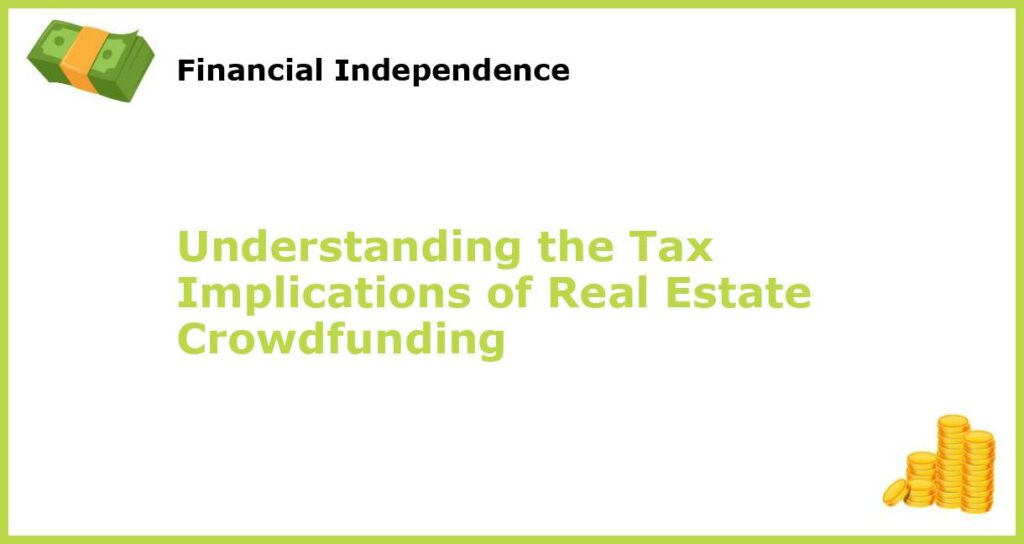Real estate crowdfunding is the new buzzword in investment circles. What exactly is it, and what are the tax implications of investing in it? Read on to learn more.
What is real estate crowdfunding?

Real estate crowdfunding is a relatively new form of investment which enables individuals to pool their financial resources together in order to invest in real estate ventures. This type of investment can come in various forms such as equity, debt or a combination of both. Through crowdfunding, investors can get access to real estate projects that they may not have been able to access before.
How does real estate crowdfunding work?

Real estate crowdfunding works by allowing individuals to invest in specific properties or portfolios of properties through an online platform. These investments are typically managed by a professional real estate company or developer, who manages the asset and distributes the income generated from the investment to the investors. Investors can choose to invest a certain amount of money in a project, and once the project is complete, they can then receive a percentage of the profits from their investment.
What are the tax implications of real estate crowdfunding?

When investors invest in real estate crowdfunding, they are subject to certain tax implications that they should be aware of. First, investors may be required to pay taxes on any income generated from the investment, which may include rental income or capital gains. Secondly, depending on the type of investment, investors may also be eligible for certain tax deductions or credits. It is important for investors to understand these tax implications to avoid any surprises later on.
What are the tax deductions available to real estate crowdfunding investors?

One of the main tax deductions available to real estate crowdfunding investors is depreciation. This allows investors to deduct a portion of the property’s value over a set period of time. Investors who hold the property for more than a year may also be eligible for the long-term capital gains tax rate, which is typically lower than the short-term capital gains tax rate. This can significantly reduce the amount of tax that the investor is required to pay.
What are the tax credits available to real estate crowdfunding investors?
One potential tax credit available to investors is the Low-Income Housing tax credit, which is designed to incentivize developers to create affordable rental housing. This tax credit can be a significant benefit for investors who want to invest in affordable housing projects. Other tax credits that investors may be eligible for include those related to renewable energy or historic preservation if these features are incorporated into the property.
How does investing in real estate crowdfunding impact taxes?
Investing in real estate crowdfunding can have a significant impact on an investor’s taxes, particularly if they are generating income from the investment. It is important for investors to understand the tax implications of their investment and to consult with a tax professional when necessary. Investors should be aware of the tax deductions and credits available to them, and should take advantage of these benefits to lower their tax liability.
What are the potential risks of investing in real estate crowdfunding?
As with any type of investment, there are potential risks associated with investing in real estate crowdfunding. These may include the risk of losing all or part of the investment, limited liquidity, and the potential for changes in tax laws that impact the investment. Investors should carefully evaluate the risks and rewards of any investment opportunity before committing their funds.
How can investors mitigate the risks of investing in real estate crowdfunding?
Investors can mitigate the risks of investing in real estate crowdfunding by conducting thorough due diligence on the investment opportunity. They should research the investment’s returns, the strength of the development team, and the market demand for the project. Diversifying their portfolio by investing in multiple projects can also help to mitigate risks. Investors should also carefully review the terms of the investment before committing any funds, and consult with a financial professional before making any investment decisions.
What should investors consider when selecting a real estate crowdfunding platform?
Investors should carefully evaluate the various real estate crowdfunding platforms available to them. They should consider the platform’s track record of successful investments, the level of transparency and communication with investors, the fees associated with investing, and the quality of the investment opportunities available. An investor can achieve success by considering these factors and selecting the right platform to suit their investment goals.
What is the outlook for real estate crowdfunding?
The outlook for real estate crowdfunding is bright. As the industry continues to evolve, it is likely that more investors will turn to real estate crowdfunding for their investment needs. The industry is increasing in popularity because it offers investors access to real estate opportunities that would previously have been inaccessible. As technology continues to improve, investors are able to invest in real estate with greater confidence and ease.







